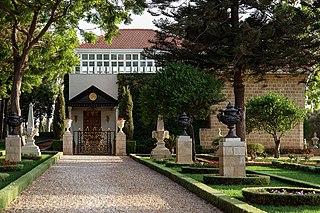
The Kitáb-i-Aqdas or Aqdas is the central book of the Bahá'í Faith written by Bahá'u'lláh, the founder of the religion, in 1873. The work was written in Arabic under the Arabic title al-Kitābu l-Aqdas, but it is commonly referred to by its Persian title, Kitáb-i-Aqdas, which was given to the work by Bahá'u'lláh himself. It is sometimes also referred to as "the Most Holy Book", "the Book of Laws" or the Book of Aqdas. The word Aqdas has a significance in many languages as the superlative form of a word with its primary letters Q-D-Š.

The Universal House of Justice is the nine-member supreme ruling body of the Bahá'í Faith. It was envisioned by Bahá'u'lláh, the founder of the Bahá'í Faith, as an institution that could legislate on issues not already addressed in the Bahá'í writings, providing flexibility for the Bahá'í Faith to adapt to changing conditions. It was first elected in 1963, and subsequently every five years, by delegates consisting of the members of Bahá'í National Spiritual Assemblies throughout the world.
Bahá'u'lláh was the founder of the Bahá'í Faith. He was born in 1817 to Khadíjih Khánum and Mírzá Buzurg of Nur, a Persian nobleman, and went on to be a leader in the Bábí movement, and then established the Bahá'í Faith in 1863. Bahá'u'lláh's family consists of his three wives and the children of those wives.
The Hands of the Cause of God, Hands of the Cause, or Hands (informally) were a select group of Bahá'ís, appointed for life, whose main function was to propagate and protect the Bahá'í Faith. Unlike the members of the elected institutions and other appointed institutions in the Bahá'í Faith, who serve in those offices, Hands are considered to have achieved a distinguished rank in service to the religion.
The Bahá'í administration or Bahá'í administrative order is the administrative system of the Bahá'í Faith. It is split into two parts, the elected and the appointed. The supreme governing institution of the Bahá'í Faith is the Universal House of Justice, situated in Haifa, Israel.
Spiritual Assembly is a term given by `Abdu'l-Bahá to refer to elected councils that govern the Bahá'í Faith. Because the Bahá'í Faith has no clergy, they carry out the affairs of the community. In addition to existing at the local level, there are national Spiritual Assemblies.
The Bahá'í Faith has had challenges to its leadership, usually at the death of the head of the religion. The vast majority of Bahá'ís have followed a line of authority from Bahá'u'lláh to `Abdu'l-Bahá to Shoghi Effendi to the Custodians to the Universal House of Justice. Sects diverging from this line of leadership have failed to attract a sizeable following. In this sense, there is only one major branch of the Bahá'í Faith, represented by at least 5 million adherents, whereas the groups that have broken away have either become extinct with time, or have remained very small in number, representing far less than 0.1% of all Bahá'ís. Globally the Bahá'í community has maintained its unity.
Bahá'í laws are laws and ordinances used in the Bahá'í Faith and are a fundamental part of Bahá'í practice. The laws are based on authenticated texts from Bahá'u'lláh, the founder of the Bahá'í Faith, and also includes subsequent interpretations from `Abdu'l-Bahá and Shoghi Effendi, and legislation by the Universal House of Justice. Bahá'í law is presented as a set of general principles and guidelines and individuals must apply them as they best seem fit. While some of the social laws are enforced by Bahá'í institutions, the emphasis is placed on individuals following the laws based on their conscience, understanding and reasoning, and Bahá'ís are expected to follow the laws for the love of Bahá'u'lláh. The laws are seen as the method of the maintenance of order and security in the world.
The Bahá'í Faith takes no position on the sexual practices of those who are not adherents. Within the Bahá'í community, where membership is freely chosen, permissible sexual relations are limited to those between a man and a woman in marriage. Adherents are expected to abstain from sex outside of matrimony, thus premarital, extramarital, or homosexual intimacy are excluded from allowable Bahá'í practices.
The theme of education in the Bahá'í Faith is given emphasis. Its literature gives a principle of universal and compulsory education, which is identified as one of key principles alongside monotheism and the unity of humanity.

A Bahá'í pilgrimage currently consists of visiting the holy places in Haifa, Acre, and Bahjí at the Bahá'í World Centre in Northwest Israel. Bahá'ís do not have access to other places designated as sites for pilgrimage.

The Tablets of Bahá’u’lláh Revealed After the Kitáb-i-Aqdas are selected tablets written by Bahá'u'lláh, the founder of the Bahá'í Faith, and published together as of 1978. The current edition bears the title Fountain of Wisdom: A Collection of Writings from Bahá'u'lláh.
Huqúqu'lláh, sometimes called the Law of Huqúq is a socio-economic and spiritual law of the Kitáb-i-Aqdas, a charter document of the Bahá'í Faith, written by Bahá'u'lláh. In its most basic form, it states that Bahá'ís should make a 19% voluntary payment on any wealth in excess of what is necessary to live comfortably, after the remittance of any outstanding debt. The money is then disbursed to social and economic development projects, or similar philanthropic purposes.
The Nineteen-Day Fast is a nineteen-day period of the year, during which members of the Bahá'í Faith adhere to a sunrise-to-sunset fast. Along with obligatory prayer, it is one of the greatest obligations of a Bahá'í, and its chief purpose is spiritual; to reinvigorate the soul and bring the person closer to God. The fast was instituted by the Báb, and accepted by Bahá'u'lláh, the founder of the Bahá'í Faith, who stated its rules in his book of laws, the Kitáb-i-Aqdas. The nineteen days of fasting occur immediately before the beginning of the Bahá'í New Year, on the vernal equinox.
The phrase "New world order" in the Bahá'í Faith refers to the replacement of the collective political norms and values of the 19th century with a new system of worldwide governance that incorporates the Bahá'í ideals of unity and justice for all nations, races, creeds, and classes. The idea of world unification, both politically and spiritually, is at the heart of Bahá'í teachings.

The Birth of Bahá'u'lláh is one of nine holy days in the Bahá'í calendar that is celebrated by Bahá'ís and during which work is suspended. The holy day celebrates the birth of Bahá'u'lláh, the founder of the Bahá'í Faith. The 2017 date is October 22.
Prayer in the Bahá'í Faith refers to two distinct concepts: obligatory prayer and general or devotional prayer. Both types of prayer are composed of reverent words which are addressed to God, and the act of prayer is one of the most important Bahá'í laws for individual discipline. The purpose of prayer in the Bahá'í Faith is to grow closer to God and his Manifestation and to help better one's own conduct and to request divine assistance.
The following outline is provided as an overview of and a topical guide to the Bahá'í Faith.
The Guardian is a hereditary office of the Bahá'í Faith that is first mentioned in the Will and Testament of `Abdu'l-Bahá. Shoghi Effendi was named as the first Guardian of the Bahá'í Faith, and future Guardians were to be appointed from among the male descendants of Bahá'u'lláh. However, since Shoghi Effendi died without having named a successor Guardian, no person could be named to fulfill the position after his death on November 4, 1957, and he remains the only individual acknowledged as Guardian of the Bahá'í Faith, but his guidance remains in the written record of his many writings.









